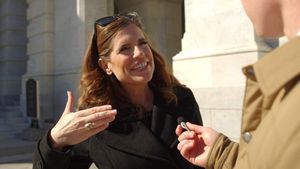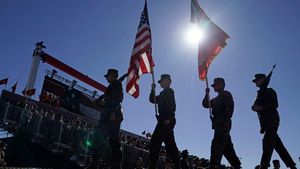1) NATIONAL POLICY ON GAYS AND LESBIANS
Girl Scouts: The Girl Scouts of the USA's LGBT-inclusive policies have drawn the ire of right-wing groups. "Girl Scouts of the USA and its local councils and troops value diversity and inclusiveness and do not discriminate or recruit on the basis of race, religion, ethnicity, sexual orientation, socioeconomic status, national origin, or physical or developmental disability," reads a statement on the organization's blog. To an ultraconservative group called Family Watch International, this amounts to "special rights based on sexual orientation or gender identity." On its website, the group claims, "Girl Scouts of the USA is increasingly promoting LGBT issues to girls by featuring prominent LGBT rights activists as role models at Girl Scout events, in Girl Scout materials, and by referring girls to websites that aggressively promote special LGBT rights." Among the "role models" right-wingers find objectionable: Houston mayor Annise Parker, an out lesbian, whose city hosted the Girl Scouts' 2011 national convention. A Houston Chronicle editorial countered the conservative "grumblings" by saying, "It's startling to realize that an event as wholesomely routine as the mayor's welcoming a Girl Scout convention to town could ever count as an act of bravery. But it does - and it's the kind of brave inclusiveness that the Girl Scouts have always stood for."
Boy Scouts: For more than 30 years, the Boy Scouts of America has in some form banned gays from the organization. A 1978 position statement signed by the BSA's president said, "We do not believe that homosexuality and leadership in Scouting are appropriate." The BSA reaffirmed its position in 1991 after James Dale, an adult gay scout in New Jersey, came out in a newspaper story. The BSA revoked his membership, and Dale sued, claiming the organization had violated his state's public accommodations law. The case made its way to the U.S. Supreme Court, which in 2000 ruled 5-4 to that the BSA, as a private organization, had right to set its own policies and membership criteria. Last June the BSA reaffirmed its ban on gay members, staff, and leaders. The current policy reads, "While the BSA does not proactively inquire about the sexual orientation of employees, volunteers, or members, we do not grant membership to individuals who are open or avowed homosexuals or who engage in behavior that would become a distraction to the mission of the BSA."
2) POLICY UPDATES WITHIN THE LAST YEAR
Girl Scouts: In October 2011, a Colorado Girl Scouts troop decided to admit a 7-year-old transgender girl, Bobby Montoya, after initially rejecting the child. The statewide organization released a statement saying, "If a child identifies as a girl and the child's family presents her as a girl, Girl Scouts of Colorado welcomes her as a Girl Scout. In this case, an associate delivering our program was not aware of our approach. She contacted her supervisor, who immediately began working with the family to get the child involved and supported in Girl Scouts. We are accelerating our support systems and training so that we're better able to serve all girls, families and volunteers."
Boy Scouts: The BSA's reaffirmation of its ban on "avowed homosexual" members and leaders came after a two-year review by a committee of "volunteers and professional leaders" with "a diversity of perspectives and opinions," according to a statement released on BSA's website. chief scout executive Bob Mazzuca said in the press release, "While a majority of our membership agrees with our policy, we fully understand that no single policy will accommodate the many diverse views among our membership or society."
3) SPONSORS
Girl Scouts: Corporations and foundations that support the Girl Scouts include Alcoa, AT&T, Coca-Cola, MetLife, the Jessie Ball duPont Fund, and Rockefeller Philanthropy Advisors, according to the organization's website.
Boy Scouts: About 70 % of BSA units are sponsored by religious organizations, with about half of these units being Mormon-backed, according to the Scouts' website. About 30% of units are sponsored by civic and educational groups.
Many corporate-backed foundations have donated millions to BSA despite internal policies against giving to groups that discriminate on the basis of sexual orientation. In 2010, the most recent year for which information was available, 23 of the top 50 corporate foundations gave at least $10,000 each to the Scouts for a combined total of $3.6 million. The Intel Foundation, the top donor that year, gave $700,000; the Verizon Foundation donated more than $300,000; and the corporate giving arms of Wells Fargo, U.S. Bank, and Bank of America each chipped in more than $100,000.




































































Charlie Kirk DID say stoning gay people was the 'perfect law' — and these other heinous quotes